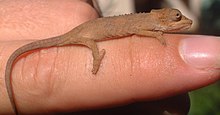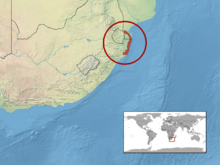Setaro's dwarf chameleon
Appearance
| Setaro's dwarf chameleon | |
|---|---|

| |
| Scientific classification | |
| Domain: | Eukaryota |
| Kingdom: | Animalia |
| Phylum: | Chordata |
| Class: | Reptilia |
| Order: | Squamata |
| Suborder: | Iguania |
| Family: | Chamaeleonidae |
| Genus: | Bradypodion |
| Species: | B. setaroi
|
| Binomial name | |
| Bradypodion setaroi Raw, 1976
| |

| |
Setaro's dwarf chameleon (Bradypodion setaroi) is a species of lizard in the family Chamaeleonidae.
Etymology
[edit]The specific name, setaroi, is in honor of Gordon Setaro who collected the holotype with Raw.[3]
Description
[edit]With a total length (including tail) of about 10 cm (3.9 in), B. setaroi is one of the smallest of all the dwarf chameleons. It has a reduced throat crest and a tail that is longer than the body in males, and shorter than the body in females.
Geographic range and habitat
[edit]B. setaroi is endemic to South Africa, where it is restricted to coastal dune forests in northern Kwazulu Natal. It adapts well to suburban gardens, but domestic cats - as introduced predators - will usually kill all chameleons in the immediate area.[1]
References
[edit]- ^ a b Tolley, K.A. (2022). "Bradypodion setaroi". IUCN Red List of Threatened Species. 2022: e.T3012A197397314. Retrieved 30 July 2022.
- ^ "Appendices | CITES". cites.org. Retrieved 2022-01-14.
- ^ Beolens, Bo; Watkins, Michael; Grayson, Michael (2011). The Eponym Dictionary of Reptiles. Baltimore: Johns Hopkins University Press. xiii + 296 pp. ISBN 978-1-4214-0135-5. (Bradypodion setaroi, p. 241).
Further reading
[edit]- Raw LRG (1976). "A survey of the dwarf chameleons of Natal, South Africa, with description of three new species". Durban Museum Novitates 11 (7): 139–161. (Bradypodion setaroi, new species).
External links
[edit]

